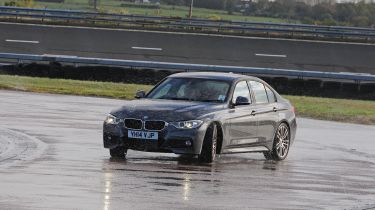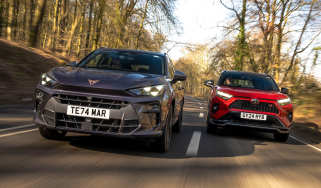How to control understeer and oversteer in your car
Controlling a skid is something most drivers don't have to do often, but understanding understeer and oversteer is useful all the same

With winter now firmly upon us, some poor weather is unavoidable. This means drivers are going to have to be on the lookout for hazards such as black ice or standing water, which can cause a sudden loss of control over a car.
Such a loss of control will manifest itself as a slide, which will then develop into either oversteer or understeer, depending on a variety of factors, including the type of car being driven, how it’s being steered, and how much the throttle and brakes are being used.
If you do find yourself behind the wheel of a car going into a skid, you’re either going to have to deal with understeer or oversteer. The former is the more common and easier of the two to handle, but the latter can still be controlled. We explain how to deal with both below.
Above all else, it’s important to remain calm if you feel you’re starting to lose control of your car – panicking will just increase the chance of an accident. Even if an accident is unavoidable, there will still be mitigating action you can take.
Be sure to look as far ahead down the road as possible, taking note of any potential hazards along the way. Also, pay close attention to what the front wheels of your car are doing through the steering wheel, this is how you monitor whether all is well or if something has gone wrong.
What to do when your car understeers
Understeer is caused when the front wheels of a car slip on the road surface while the rears still have grip. It usually occurs when you carry too much speed into a corner, and when you go to apply steering lock, the car wants to continue straight ahead, rather than following the direction of the front wheels around the corner.
Applying more lock won't help because the front tyres have lost grip and you won't regain any by doing so. Instead, the first thing you must do is slow down, then take some steering lock off to help the tyres regain grip. If you've slowed enough, then adding lock again to get around the corner should see you back on course, but if it doesn't help, then you need to slow even further. However, if the road is slippery, then just backing off the throttle might be the only thing you can do, because stepping hard on the brakes will only make matters worse.
What to do when your car oversteers
Oversteer affects the rear wheels, and there are two types of oversteer to contend with. The first happens under braking, where the car's weight transfers towards the front of the car, causing the rear end to become light and lose grip. If you are steering, then the momentum can then bring the back end of the car around like a pendulum. In this instance, you need to steer into the skid, so if the car swings out to the left, you need to steer to the left.
What you must not do is apply the brakes, because this will only make the situation worse. Instead, a light application of the throttle should settle the rear end, so that you can take some steering lock off and follow the corner round. Through all this, you should be looking to where you want to go, because this will help you keep the car under control.
The other oversteer situation happens on the exit of a corner, and usually happens when too much power has been applied. You'll see this situation in videos where presenters drive powerful rear-drive cars in tyre-smoking burnouts, and it's the basic principle behind the drift movement. Again, if this happens in the real world, you need to steer in the direction of the skid to mitigate the situation. Braking suddenly will only make the situation worse, so you need to try and be smooth and either maintain speed or scrub off speed gradually while adjusting the steering so that the nose of the car is pointing in the direction of travel. Again, look where you want to go, and the car should follow.
What are your top tips for driving in winter weather? Let us know in the comments section below...
Best winter cars
| • Best electric SUVs to buy now | • Best SUVs to buy now |
| • Best crossovers to buy now | • Best small 4x4s to buy now |
Get ready for winter on the roads
Top tips for winter driving
Find a car with the experts



